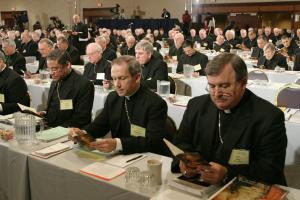Issue Date: November 21, 2003
By JOE FEUERHERD Nearly 300 amendments were offered to the document under consideration -- the largest number of proposed revisions to any issue considered by the American bishops at their three-day semi-annual meeting. The topic was controversial and confusing, touching on areas of doctrine and practice that hit close to home for millions of American Catholics. Gay marriage or civil unions? Nope. The controversial proposal concerned revisions to the guidance provided to dioceses that do not have enough priests to celebrate Sunday Mass at every parish, so-called “Sunday Celebrations in Absence of a Priest.” However contentious outside the meeting hall -- gay rights advocates conducted daily vigils in front of the Capitol Hill Grand Hyatt -- the bishops’ vote for a brochure reiterating their support for traditional marriage and their opposition to gay marriage was a slam-dunk inside the assembly. By a vote of 234-3 the bishops approved the document, “Between Man and Woman: Questions and Answers About Marriage and Same-Sex Unions.” Slight angst arose over how to characterize gay sex. The bishops rejected amendments that would have termed such behavior as “gravely sinful” or “gravely evil.” Instead, the brochure will note that “both homosexual acts and unjust discrimination against homosexual persons” are immoral. The revised guidelines for priestless celebrations, offered by Chicago Cardinal Francis George, chairman of the liturgy committee, proved more disconcerting to the body of bishops. One fear expressed by the bishops is that the celebrations -- in which previously consecrated hosts are distributed and scripture readings offered in a service typically presided over by a layman or laywoman -- too closely resemble a Mass. Bishop Anthony Bosco of Greensburg, Pa., said he worries that parishioners will leave the service thinking that “Mrs. Garibaldi had a nice Mass today.” George responded that the readings and responses were organized in such a way as to clearly distinguish them from a Mass. The sign of peace, for example, comes at the end of the service and not prior to reception of the Eucharist, said George. Chicago Auxiliary Bishop Thomas J. Paprocki shifted the conversation, however obliquely, to the elephant in the middle of the room: the priest shortage and the impact of mandatory priestly celibacy on the shortfall. Paprocki said he was concerned that the document could be read to encourage bishops to violate church law by allowing priests to preside at more than three Masses on any given Sunday. Bishop John Kinney of St. Cloud, Minn., said his diocese “is stretched farther and farther” because of the priest shortage. George appeared sympathetic to the concerns, but argued that the document was not the appropriate place to engage it. The document, said George, is a revision to established guidelines and “not a response” to the clergy shortage. “It would be a mistake to see this in relation to the statistics that were given out yesterday,” said George, in apparent reference to clergy-shortage figures distributed by optional celibacy advocates at a Nov. 11 news conference. In a brief interview with the Milwaukee Journal-Sentinel Nov. 10, George said he was open to a discussion of optional celibacy, but that the bishops’ conference was not the place to engage the issue. “I have no problem with bishops discussing it, but it has to be understood, a conference [the U.S. Conference of Catholic Bishops] is to deal with the business of the church that we can decide something about,” said George. “I think it has to be discussed, I’m not sure this is the venue.” The bishops approved the document, which now must be submitted to the Vatican. In other areas the bishops:
Chopko said that increased government regulation of church-affiliated institutions poses a threat to religious liberty. “A key example,” he said, “is the effort in several states … to insist that all employers who offer prescription drug coverage for their employees must include contraceptives and drugs that cause abortion.” The Catholic church should “build bridges” with other religious communities to oppose these efforts, said Chopko. National Catholic Reporter, November 21, 2003 |
